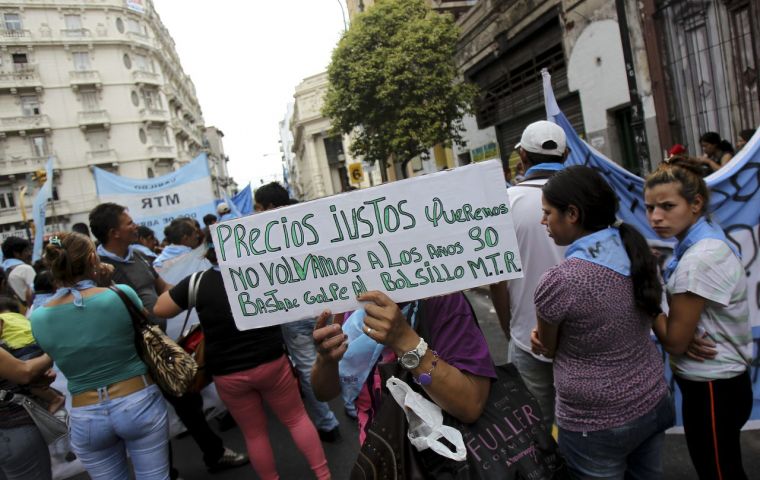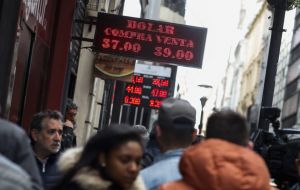MercoPress. South Atlantic News Agency
Wholesale prices in Argentina reach 73.5% in 2018; Peso rallies 10% in the midst of recession
 Retail prices in South America's second largest economy climbed 47.6% in 2018, the official INDEC statistics agency reported earlier this week
Retail prices in South America's second largest economy climbed 47.6% in 2018, the official INDEC statistics agency reported earlier this week  Much of the Peso’s recent gains are simply a correction from last year’s losses, combined with a rebound in global investors’ appetite for risk this year
Much of the Peso’s recent gains are simply a correction from last year’s losses, combined with a rebound in global investors’ appetite for risk this year Wholesale prices in Argentina shot 73.5% higher in 2018, government data showed on Thursday, the fastest rate since 2002 when they climbed 118% during an economic crisis that tossed millions of middle-class Argentines into poverty.
Retail prices in South America's second largest economy climbed 47.6% in 2018, the official INDEC statistics agency reported earlier this week, their biggest advance since 1991 when consumer price inflation was around 84%.
Argentina is in a recession that the government and International Monetary Fund expect to end toward the middle of 2019, while inflationary pressures are expected to ease. The country has a US$ 56 billion financing deal with the Fund.
In the midst of the recession the Argentine peso has rallied so much in recent months that it’s testing a currency band designed to help the bank rebuild its credibility. The band was conceived in September with the blessing of the IMF when the peso was losing half of its value amid a selloff.
The band was supposed to allow for a slow and controlled weakening of the currency, which now floats within a defined range that’s adjusted daily. If the currency strays above or below that range, the central bank can -- but is not obliged to -- sell or buy dollars to intervene in the exchange rate.
The Peso has rallied 10% against the dollar since the rolling out of the plan, which also included freezing the amount of pesos in circulation and keeping interest rates near 60%. While a stronger currency is helping Argentina fight inflation and adjust its external accounts, it might again hurt the central bank’s credibility.
However the central bank has bought US$ 190 million since Jan. 10, but the Peso has remained mostly under the defined range.
Lowering interest rates faster could boost borrowing and economic growth, while reducing demand for pesos in the market. But that strategy carries its own risks. Former central bank chief Federico Sturzenegger lowered interest rates in January 2018, only to sharply raise them in April. He resigned in June, admitting he’d lost credibility.
Much of the Peso’s recent gains are simply a correction from last year’s losses, combined with a rebound in global investors’ appetite for risk this year. Domestically, inflation is slowing and President Mauricio Macri, the market favorite, has seen a bump in approval ratings.
Yet there’s good reason to expect the Peso will eventually weaken. Argentina is in a recession, inflation is expected to end this year around 30% and uncertainty surrounding the October presidential election could trigger another currency rout.




Top Comments
Disclaimer & comment rules-

-

-

Read all comments“Retail prices in South America's second largest economy climbed 47.6% in 2018, the official INDEC statistics agency reported earlier this week”
Jan 18th, 2019 - 10:03 pm +1That is almost 13.2 Kirschner-INDEC per cent!
Our Sepoys are doing just great!
Jan 18th, 2019 - 10:52 pm 0Funny to see on the same MP page an old story headlined with a quote from Macri, “Argentina has left the populist experiment and no other country has its potential.”
Jan 18th, 2019 - 05:42 pm -1Thanks to the abandonment of the “populist experiment,” the Macri government has no doubt unleashed the country's potential, as can be appreciated in the above story.
Which leaves one scratching one's head. Was populism that bad after all?
Commenting for this story is now closed.
If you have a Facebook account, become a fan and comment on our Facebook Page!